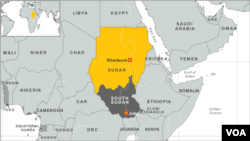STATE DEPARTMENT — The United States says it is time that Sudan accept an African Union plan to pull back troops from both sides of its contentious border with South Sudan. Officials say that could help move forward an agreement to restore oil exports.
Demilitarizing the border between Sudan and South Sudan starts with agreeing on a map drawn up by the African Union to demarcate the division between the countries. South Sudan has accepted the map. Sudan has not.
"Once that is accepted, we can move ahead on the other elements of demilitarization. So that is the first priority. And Khartoum must come around to accepting the map. Second, there are good proposals before Khartoum on humanitarian access. We are waiting for their response to a plan of action. Again, Khartoum has the action here, and we need to hear from them right away," said Princeton Lyman, the U.S. special envoy for Sudan and South Sudan.
Lyman says accepting the African Union plan would go a long way toward minimizing tensions along the border, some of which are fueled by fighting and food shortages in the regions of Southern Kordofan and Blue Nile.
"There is very great importance to getting humanitarian access and a cessation of hostilities in the areas of Southern Kordofan and Blue Nile because that, too, affects the security along the border. If we can get progress toward those in the next few weeks, then the oil agreement can go forward and be implemented with some confidence," Lyman said.
The oil agreement reached earlier this month is meant to end a standoff over revenue sharing. At independence last July, South Sudan took with it more than three-quarters of the oil reserves, while the bulk of processing and export facilities remained in Sudan.
In January, South Sudan shut down all oil production during a dispute over how much Sudan was charging South Sudan to use export pipelines. Lyman says the new deal will help both governments find a more stable source of revenue.
"It will have to be implemented carefully as they inspect all the wells and get all the procedures and processes up. It also relates to other issues that are being negotiated at the same time. So when you put that all together, I would say production won't start for at least several months, and revenue probably won't be significant until early 2013," Lyman said.
Sudan and South Sudan are expected to resume talks on outstanding border and citizenship issues in Addis Ababa on Sunday.
Demilitarizing the border between Sudan and South Sudan starts with agreeing on a map drawn up by the African Union to demarcate the division between the countries. South Sudan has accepted the map. Sudan has not.
"Once that is accepted, we can move ahead on the other elements of demilitarization. So that is the first priority. And Khartoum must come around to accepting the map. Second, there are good proposals before Khartoum on humanitarian access. We are waiting for their response to a plan of action. Again, Khartoum has the action here, and we need to hear from them right away," said Princeton Lyman, the U.S. special envoy for Sudan and South Sudan.
Lyman says accepting the African Union plan would go a long way toward minimizing tensions along the border, some of which are fueled by fighting and food shortages in the regions of Southern Kordofan and Blue Nile.
"There is very great importance to getting humanitarian access and a cessation of hostilities in the areas of Southern Kordofan and Blue Nile because that, too, affects the security along the border. If we can get progress toward those in the next few weeks, then the oil agreement can go forward and be implemented with some confidence," Lyman said.
The oil agreement reached earlier this month is meant to end a standoff over revenue sharing. At independence last July, South Sudan took with it more than three-quarters of the oil reserves, while the bulk of processing and export facilities remained in Sudan.
In January, South Sudan shut down all oil production during a dispute over how much Sudan was charging South Sudan to use export pipelines. Lyman says the new deal will help both governments find a more stable source of revenue.
"It will have to be implemented carefully as they inspect all the wells and get all the procedures and processes up. It also relates to other issues that are being negotiated at the same time. So when you put that all together, I would say production won't start for at least several months, and revenue probably won't be significant until early 2013," Lyman said.
Sudan and South Sudan are expected to resume talks on outstanding border and citizenship issues in Addis Ababa on Sunday.











